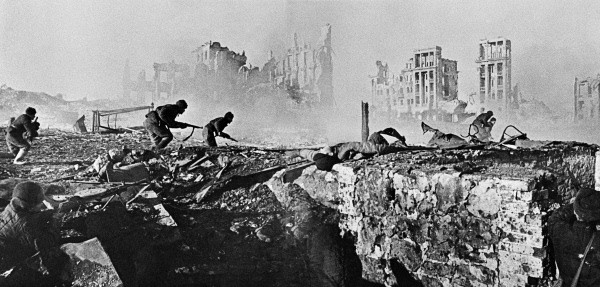
Have We All Got To Die Then?
“Have we all got to die then?” she asked.
There was no reply.
Meanwhile a man on foot went past below.
He saw the smashed-up cars and began nosing round them.
Leaning over into one of them he pulled out a gay parasol, a lady’s handbag and a bottle of wine.
Then he sat down contentedly on the wall, took a drink from the bottle and ate something wrapped in tinfoil out of the handbag. After emptying the bottle he went on, well pleased, with the parasol clasped under his arm; and I said to Gustav: “Could you find it in you to shoot at this good fellow and make a hole in his head? God knows, I couldn’t.” “You’re not asked to,” my friend growled. But he did not feel very comfortable either.
We had no sooner caught sight of a man whose behavior was harmless and peaceable and childlike and who was still in a state of innocence than all our praise-worthy and most necessary activities became stupid and repulsive. Pah—all that blood!
We were ashamed of ourselves. But in the war there must have been generals even who felt the same.
—excerpt, Steppenwolf by Hermann Hesse p. 189
“Have we all got to die then?” she asked.
Sunday morning and there’s no sunrise. With a heavy gray cloud cover showers are promised for the rest of the day. I returned to Steppenwolf by Hermann Hesse desiring to reread the last few pages which detail the main character’s resolution. Harry Haller is a profoundly disturbed individual. Are not we all?
In the twilight of his life, an individual of solitude, of substantial intellectual accomplishment, Harry finds himself at the end of an evening of music, dancing, and merriment. A masked costume party is not exactly the sort of atmosphere which Harry finds congenial to his bookish and curmudgeonly temperament. Harry has reluctantly attended at the urging of a female friend. Now at evening’s end as the dawn breaks Harry is invited to experience several virtual-reality like scenarios, each of which is behind a door which Harry may chose to enter.
The few lines excerpted above are from one of these dreamlike scenarios in which Harry finds himself with a boyhood friend, Gustav. The two former chums, now adults are involved in the killing of a war brought on by over population. The war is a populist uprising by the common folk against the “One Percenters” and their hegemony over Nature and the common man by means of their technology. As you might imagine this is a violent interlude, a thought experiment where the butchers-bill of war is presented.
The few lines quoted are the conclusion of this thought experiment. As a reader I am haunted by the question asked by the female character. The question bears asking, again and again……..